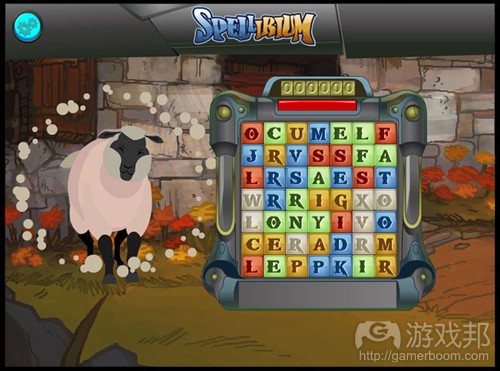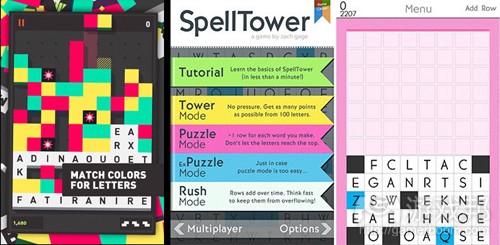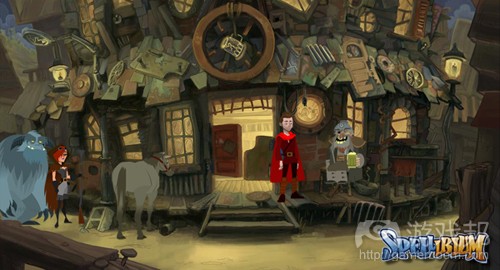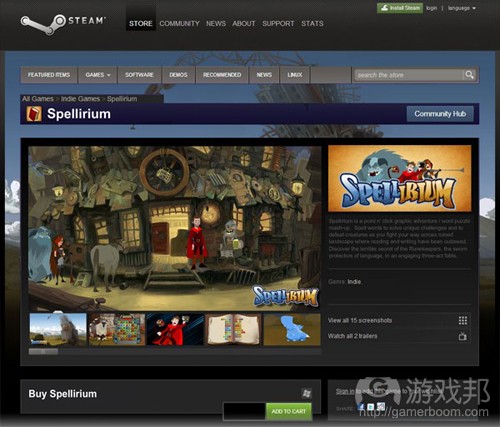阐述如何让游戏营销符合付费玩家预期
作者:Ryan Creighton
你曾遇到过营销不当的电子游戏或电影吗?不少玩家在体验新晋独立游戏《Dear Esther》与《Proteus》后表示出失望,因为它们不具备游戏性,此外,无数影迷到电影院观看Kevin James或Adam Sandler的电影,是因为其预告片令他们信服该影片十分有趣。
在测试《Spellirium》这款即将问世的指向点击图画冒险与字谜结合的游戏时,我又重复之前犯下的过错:过度依赖那些始终并不喜爱这类题材的游戏开发好友的建议,并不断告诉自己只要找到欣赏它的用户即可。因此,我决定改正《Spellirium》测试时犯下的错误。以下是我的计划。
了解喜好
几年前,我在测试《Interrupting Cow Trivia》(游戏邦注:以下简称《ICT》)时面临过不少挑战,虽然在此过程中吸取了不少重大教训,但其中有些至今仍是个谜团。最重要的是,《ICT》测试令我明白应根据测试员的喜好衡量他们提交的反馈。如果你邀请一个休闲益智游戏玩家(比如我)测试《战争机器》,你不一定会获得完善该作的有益反馈……最终可能是有点迎合休闲益智游戏用户的不当作品。
因此,我重新修改为《ICT》测试者准备的反馈调查,设置首个问题为“你喜爱益智问答游戏吗?”如果答案为“否定”,那么其剩余反馈只需粗粗略过即可。
文字游戏
我曾让非文字游戏粉丝的测试员测试了《Spellirium》。我是怎么知道的?答案是通过大量“暗示”。最显眼的是在玩家难以组合出一个单词的时候。《Spellirium》中设置了49个字母网格,你可以从中抽选出3-8个字母,以任意顺序组合单词。当某个玩家挣扎于构造3个字母的单词时,我便知晓一二分。
如果玩家能够轻轻松松组合单词,那也“透露”出他并不是文字游戏玩家:通常这些玩家会利用“普通”字母创造6-7个字母长的单词,失望的是,他并没有因此获得《Peggle》类型的烟花奖励。曾有不少测试员抱怨说(或表示惊讶),诸如“TESTERS”单词的分数竟然比“POX”还要低。当然,所有《Scrabble》玩家都知道,同比常用字母RSTLNE,使用诸如P或X这种高价值字母构造单词更是罕见/独特/困难。
而玩家的这种困惑显然体现在去年同期发行的《Puzzlejuice》与《Spelltower》这两款iOS文字游戏。前者作者Asher Vollmer透露,实际上他被迫于玩家压力,将该作的得分机制改为奖励长单词,而不是包含高价值字母的单词。与此同时,后者的玩法更具难度,因为网格中填满X、Z、Q、K字母,意在强调利用它们构造单词更加棘手。
(《Puzzlejuice》与《Spelltower》:两种解决字母价值问题的不同方法)
因此在测试《Spellirium》期间,我不断告诉自己只要获得“正确的”玩家类型即可——即那些非常喜爱该作的用户。不幸的是,推广工作并未取得这般结果。
游戏营销
事实上,通过好友或网站了解游戏便是一种游戏推广模式,最终会在Steam或Good Old Games这类电子发行网站上发现销售页面。接着观看预告片,浏览画面截屏,可能会通过阅读Metacritic网站的评论再次确认其品质(或是看下它在此网站上那该死的评分)……你会设想游戏的可能玩法,确定自己是否喜爱。你会在脑海中构想自己从中获得的趣味,然后据此询问价格。如果价格吻合你所预测的乐趣(每个人的衡量标准各不相同),而且正好有购买娱乐的打算,那便完成购买行为。
也就是说,如果那是游戏的真正销售模式,我觉得有必要模拟这种环境,测量潜在用户的价值标准,而后根据他们的测试反馈确定该作是否吻合其预想。因此,我决定为《Spellirium》模拟这种销售页面,如同它正在Steam上出售(事实并非如此)。
我打算向潜在测试者展示该页面,并询问几个问题:
*你对该游戏有多大的兴趣?
*你认为哪部分性能最吸引你?而哪部分最不吸引你?
*你认为该游戏值多少钱?或者说你愿意为它掏多少钱?
*列举另一款类似该作的游戏。如果你曾玩过它请在框框中打勾。如果你喜爱它请在框框中打勾。
我可能会采用A/B测试模式,即其中一种结果是会看到游戏价格。而后针对看到价格的潜在测试员询问如下问题:
*你是打算在该游戏推出后,按此价格购买呢?还是在几个月后购买?
*你期望支付此价格能获得几个小时的游戏呢?
*同比内容描述、预告片与画面截屏,你认为该价格是偏低?偏高?还是刚刚好?
*(如果被调查者的答案是“刚刚好”)你会给该游戏定个什么价位?
假如我进行此测试只是为了谋取私利,我可能会继续更改并完善此页面,直到被调查者有望完全转化为该游戏的玩家,那我便会在无任何改动的情况下推出《Spellirium》。因为,讽刺地讲,该作是否出色已不是重点,最重要的是玩家是否乐意付费。但这并不是Untold Entertainment的运作模式!
当然,我热切希望制作出优秀作品。因此我会模拟Steam页面,通过调查筛选测试者。那些对该作表现出高度兴趣,极其乐意为它付费的被调查者将会测试这款游戏。此时,他们是否为“正当的”文字游戏玩家已不是重点:重要的是我应对那些喜爱并乐意为其付费的用户负责。如果他们挣扎于构造3个字母的单词,且希望长单词能获得奖励,那我便会为他们做出调整。因为他们是我的付费用户,而不是那些经过精选,喜爱《Spellirium》特殊玩法的神秘“完美”玩家。
是销售页面与营销手段吸引了这些玩家。我应保证他们对游戏感到满意。(本文为游戏邦/gamerboom.com编译,拒绝任何不保留版权的转载,如需转载请联系:游戏邦)
Truth in Advertising: Matching Your Game to Your Paying Players
by Ryan Creighton
[This article by Ryan Henson Creighton is re-posted from the Untold Entertainment blog, which is awesome.]
Have you ever run across a video game or movie that was wildly mis-marketed? Many players expressed their frustration after playing recent indie game releases Dear Esther and Proteus because they weren’t gamey enough, and countless moviegoers have been lured into theatres to see Kevin James or Adam Sandler movies that the trailers would have them believe are actually funny.
While testing Spellirium, our upcoming point n’ click graphic adventure / word puzzle mash-up, i started to make many of the same mistakes i made with past games: relying too much on the advice of my game dev friends who weren’t interested in the genre to begin with, and telling myself that the game just needs to find its audience to be appreciated. i’m determined to correct those mistakes with Spellirium. This is the story of how i plan to do it.
List Your Turn-Ons
i faced many challenges testing Interrupting Cow Trivia a few years back, and while i learned a few important lessons, a number of things remain a mystery to me. The most important thing that ICT testing taught me was to weigh testers’ feedback according to how “into” the game they are. If you asked a casual puzzle game fan like me to playtest Gears of War, you wouldn’t necessarily get the kind of feedback to make a better Gears of War game … you’d only end up making an unsuitable game slightly more palatable to a casual puzzle audience.
i revised my feedback survey for ICT testers to begin with the question “Do you like trivia games?” If the tester answered “no”, the rest of his feedback would get shuffled to the bottom of the stack.
A 5-Letter Word for DERP
i’ve been testing Spellirium with people who aren’t word game fans. How do i know? There are a number of “tells”. The most obvious is when it takes a player forever to build a word. Spellirium gives you a 49-letter grid, and you can make words from 3-8 letters in length using any of those 49 letters, in any order. When a player struggles to make a 3-letter word, i know something’s up.
If the player has no trouble making words, there’s another “tell” that outs the player as somewhat of a non-wordgamer: the player makes a long 6- or 7-letter word using “common” letters, and is disappointed he’s not supremely rewarded with Peggle-style fireworks. i’ve had a few testers complain (or express surprise) that a word like “TESTERS” scores lower than a word like “POX”. Of course, any Scrabble player will tell you that it’s more rare/unique/difficult to use high-value letters like P and X in a word, than with common final-round Wheel of Fortune letters like RSTLNE.
The issue of players’ reactions to high-value letters was apparent with two iOS word games that were released around the same time last year: Puzzlejuice and Spelltower. Puzzlejuice creator Asher Vollmer told me he actually bowed to player pressure and changed the game’s scoring mechanism to reward longer words instead of words containing high-value letters. Spelltower, meanwhile, becomes more difficult as the grid fills up with X’s, Z’s, Q’s and K’s, implicitly reinforcing the idea that these letters are tougher to squeeze into a word.
So through Spellirium playtesting, i kept telling myself that i just needed to get the game in front of the “right” type of player – that those who would like it, would like it a lot. Unfortunately, that’s not at all how the market works.
To Market, To Market, to Buy a Fat Game
The way the market actually works is that you catch wind of a game through a friend or a website, and you eventually stumble upon its page on a digital distribution site like Steam or Good Old Games. You watch the trailer, look at the screenshots, maybe double-check its purported quality by reading Metacritic reviews (or just glancing at the game’s damnable Metacritic score) … and you imagine what the game might be like to play, and whether you’ll enjoy it. You create a mental picture of that enjoyment you’ll get from the game, and then you compare that to the asking price. If the asking price is aligned with the enjoyment you predict you’ll get from the game (and everyone’s equation for this is different), AND you have that money to fart away on entertainment, THEN you may just complete the purchase.
So if that’s how game sales actually work, it makes more sense to me to simulate that environment, gauge potential customers’ value equations, and then determine from their testing feedback whether the game delivered on their expectations. So the approach i’m taking now is to mock up the sales page for Spellirium as if it were currently for sale on Steam (to be absolutely clear: it isn’t. Yet.).
i’m going to show potential testers this page, and then ask them a few questions:
What’s your level of interest in this game?
Which aspect(s) or features of the game interest you the most? The least?
How much do you think this game costs / what would you pay for this game?
List another game that is like this game. Tick this box if you’ve played it. Tick this box if you’ve enjoyed it.
i may A|B test this with an image that shows a price for the game, and one does not. For the potential testers who see the price, i’ll ask:
Would you buy the game at this price when it was released, or would you wait a few months for a sale?
How many hours of gameplay would you expect to get from this game at that price?
How do you feel about the price of the game compared to its description, trailer and screenshots? Too low/too high/just right?
(if respondent answers anything but “just right”) How would you price the game?
If i were to approach this exercise completely cynically, i would continue to tweak and refine the page until i got the best potential conversion from my respondents, and then release Spellirium without making any changes to it. Because, speaking absolutely cynically, it doesn’t actually matter if the game is good or bad – it only matters that people buy it. But that’s not how Untold Entertainment rolls!
Of course, i desperately do want to make a good game. So i’ll use the Steam page mock-up and survey as a funnel to decide on my testers. Those respondents who report the highest interest in playing the game, and the highest likelihood of buying it, will test the game. At that point, it doesn’t matter who is a “proper” word gamer and who isn’t: what matters is that i have an obligation to the people who are excited about my game and who want to buy it. If those players struggle to make 3-letters words, and if those players expect long words to be rewarded over tricky words, then i will adjust the game for the sake of those players. Because those players are my paying audience – not some mythical “perfect” players that i’ve hand-picked to enjoy Spellirium the specific way i’ve configured it. The players choose my game – not the other way around.
It’s the sale page and my surrounding marketing efforts that attract the player. i need to make sure that the player i attract is happy with the object of that attraction.(source:gamasutra)
上一篇:影响未来游戏开发的4大付费趋势
下一篇:将情感带进游戏设计中的5大步骤











































 闽公网安备35020302001549号
闽公网安备35020302001549号